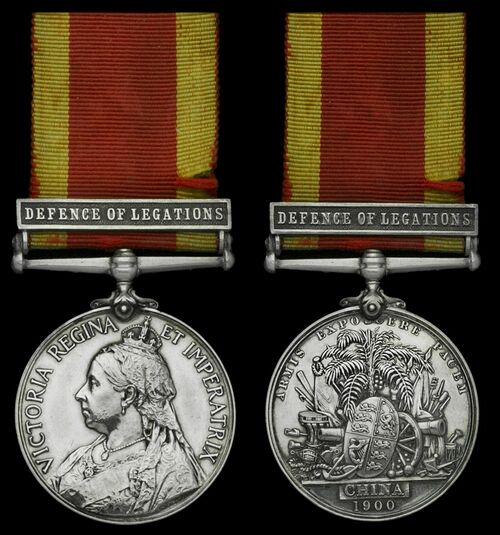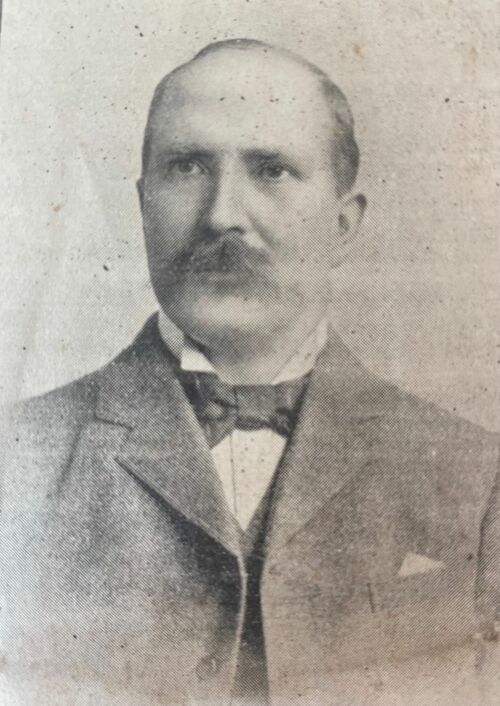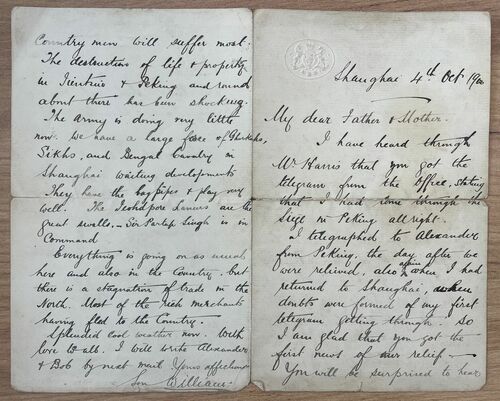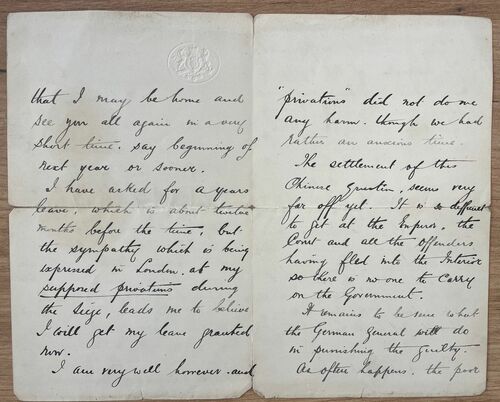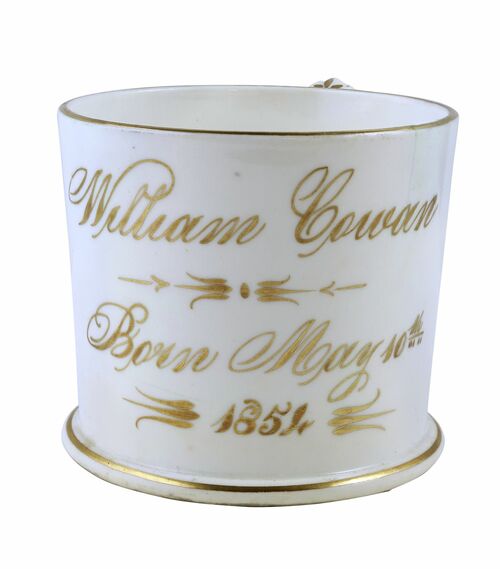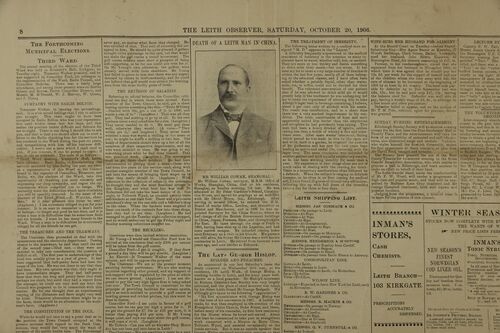Auction: 23003 - Orders, Decorations and Medals
Lot: 56
The well-documented China Medal awarded to W. Cowan, Office of Works, who was Architect to the British Legation at Pekin during the Defence of Legations in 1900; he served as a Volunteer Civilian in the Legation Guard during those famous days
China 1900, 1 clasp, Defence of Legations (W. Cowan. Office of Works), good very fine (Lot)
The only Medal with clasp 'Defence of Legations' named to the Office of Works.
Provenance:
Glendining's, Lot 417, June 1993.
William Cowan was born at Duddingston Mills, Edinburgh on 10 May 1854 and was educated at Peter Gardiner's School, Leith. Young Cowan showed skill as a draughtsman and was apprenticed to David Bruce by 1871, still living at home on Cannon Street, North Leith. He was appointed to the Board of Works in London in 1878 and took up various postings in Manchester and Bristol, whilst there joining the Royal Sussex Masonic Lodge of Hospitality (No. 187) in February 1893. Cowan was also admitted to the Royal Arch Masonic Chapter.
Out east
Cowan was posted to the China Station in September 1896, being made Surveyor for the Office of Works. Landing in Shanghai, his office was based at Yuen-min-Yuen Road and were responsible for construction, leasing and management of all British Government Buildings in China, Japan, Korea, Formosa, Siam and other interests in the Far East. He also had the opportunity to influence new buildings and was responsible for designing the Consul's House & Office at Chungking and also developed the Consular Site at Wuchow and Hangchow. Cowan also joined the Northern Masonic Lodge of China at Shanghai (No. 570) on 11 May 1899.
Defence of Legations
Cowan found himself in Pekin during 1900, a year which would see the Boxer Rebellion and place him at the centre of one of the most unusual 'great Defences' in the long and storied history of this island nation.
News of massacres of missionaries and their converts in the nearby province of Shandong combined with equivocation by the Chinese government soon led to a request, on 28 May 1900, for additional guards to be sent from the various foreign fleets stationed at the coast. The first contingents arrived from Tientsin on 31 May to bolster and protect those who remained. Francis Poole, another Defender, noted in his diary:
‘Everybody went down to meet the guards late in the afternoon. French, American, Russian, Japanese, Italian, and British. Ours and the Americans were Marines, the remainder Bluejackets, in all about 300, ours naturally the smartest.’
By 13 June the situation had deteriorated, Poole again recording:
‘Fires in all quarters of the city, mission compounds being burnt, shots fired down Legation Street...I think the row has begun...Everywhere Christians are being murdered by the Boxers.’
So it was that four days later events took another turn for the worse when Chinese Imperial Troops also began to open fire on the Legations’ defensive pickets. Naturally, when an ultimatum was issued by the Chinese Government, ordering that all diplomatic bodies in Peking would have to leave for Tientsin within 24 hours, under escort, it was treated with scepticism and those who remained feared a repeat of a similar instance of treachery - namely the ghastly Cawnpore Massacre under the Nana Sahib. Surely some of those who were present had relatives who had been slain on that occasion.
On 20 June, the murder by the Chinese of the German Minister, Baron von Ketteler, prompted a decision for all foreign women and children to be given shelter in the British Legation. Claude MacDonald, the British Minister, was in command of the Defence and their historic 55-day siege officially began in earnest. As news began to filter back home, sensational reports of massacres of the entire garrison filled column inches. The Clifton Society noted him:
'The terrible news received from China this week, recording as it does the most brutal massacre of the past hundred years, has given those who had friends or relatives in the vicinity of Pekin cause for the greatest anxiety. Amongst the martyrs who perished in the murderous attack by the Chinese on the British Legation must be reckoned - without, it is feared, the slightest shadow of doubt -....Mr William Cowan, who was architect to the British Legation, have grave fears for his safety. He went to China only four years ago, and he is known to have proceeded to the capital just prior to the outbreak of the War.'
He was very much alive and putting his weight behind the heroic efforts as a Volunteer Civilian in the Legation Guard, no doubt he spent his fair share of time manning the barricades. When the Siege was finally broken on 14 August, that gallant band were fêted across the globe. In the aftermath, Cowan was kept busy organising the vast building repairs in the Legations district, before taking leave to Shanghai. He wrote to his parents on 4 October 1900:
'My dear Father & Mother,
I have heard through Mr Harris that you got the telegram from the Office, stating that I had come through the Siege in Peking all right.
I telegraphed to Alexander from Peking, the day after we were relieved, and also again when I had returned to Shanghai, when doubts were formed of my first telegram getting through. So I am glad that you got the first news after out Relief.
You will be surprised to hear that I may be home and see you all again in a very short time, say beginning of next year or sooner.
I have asked for a years leave, which is about twelve months before the time, but the sympathy which is being expressed to London at my supposed privations during the Siege, leads me to believe I will get my leave granted now.
I am very well however and "privations" did not do me any harm though we had rather an anxious time.
The settlement of the Chinese question, seems very far off yet. It is so different to get at the Emperor, the Court and all the offenders having fled into the Interior so there is no one to carry on the Government.
It remains to be seen what the German General will do in punishing the guilty as often happens, the poor country men will suffer most.
The destruction of life & property in Tientsin + Peking and land about there has been shocking. The Army is doing very little now. We have a large force of Ghoorkas, Sikhs and Bengal Cavalry in Shanghai waiting developments.
They have the bag pipes & play very well. The Jhodpore Lancers are the great swell - Sir Partap Singh in is Commnd.
Everything is going on as usual here and also in the Country but there is a stagnation of trade in the North. Most of the rich merchants having fled to the Country.
Splendid cool weather now. I will write to Alexander & Bob by next mail.
Yours affectionately, Son William.'
Issued his Medal in April 1902, Cowan remained in China. He attended the Reception at the Kabuki-Za, Tokyo, to welcome Prince Arthur of Connaught in February 1906. He was taken ill in Shanghai later that year and died on 7 October 1906.
Sold together with a good archive comprising:
(i)
White china christening cup, the gilt inscription stating 'William Cowan, born May 10th 1854'.
(ii)
Two Masonic Certificates, Grand Lodge Freemasonry Certificate for his entry to the Royal Sussex Lodge and Royal Arch Masons' Certificate.
(iii)
His letter written from Shanghai previously quoted.
(iv)
Invitation to the welcome reception for Prince Arthur of Connaught.
(v)
Two letters of condolence written to his mother following his death, the first a long and poignant account of his illness, hospitalisation and death.
(vi)
Supreme Court for China & Corea at Shanghai legal testament related to his death, dated 15 April 1907 and with various Consular Service stamps attached.
(vii)
Two broadsheet format copies of the Leith Observer of 20 October 1906, covering his death.
Subject to 20% VAT on Buyer’s Premium. For more information please view Terms and Conditions for Buyers.
Sold for
£10,000
Starting price
£5500

